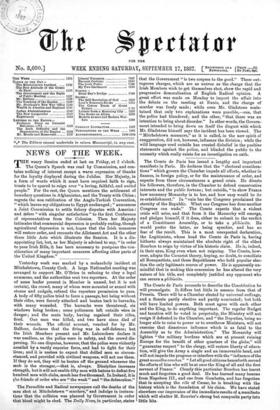The Comte de Paris proceeds to describe the Constitution he
will promulgate. It differs but little in essence from that of Prussia. There will be a Chamber elected by universal suffrage, and a Senate partly elective and partly nominated; but both will have limited powers. Both must agree with each other and the King, to do anything important. The regular Budget and taxation will be voted in perpetuity, the Ministry will not resign if defeated in the Chamber, and "the Deputies, being no • longer able to raise to power or to overthrow Ministers, will not exercise that disastrous influence which is as fatal to the Assembly as to the Administration." The Monarchy will lighten "the military burdens which are at present ruining Europe for the benefit of other quarters of the globe," will "guarantee respect" to the clergy, will restore liberty of educa- tion, will give the Army a single and an immoveable head, and will not impede the progress or interfere with the "influence of the great nouvelles couches." "Let all good citizens henceforth second the efforts of him who will be at once the King of all and the first servant of France." Clearly this particular Bourbon has learnt much and forgotten a good deaL He has learned many lessons from Napoleon III., and one from Gambetta, and has forgotten that in accepting the rile of CEesar, he is breaking with the history which is the foundation of his claim. We have stated elsewhere our impression of the immediate results of g manifesto which will shatter M. Bouvier's strong but composite party into little bits.






